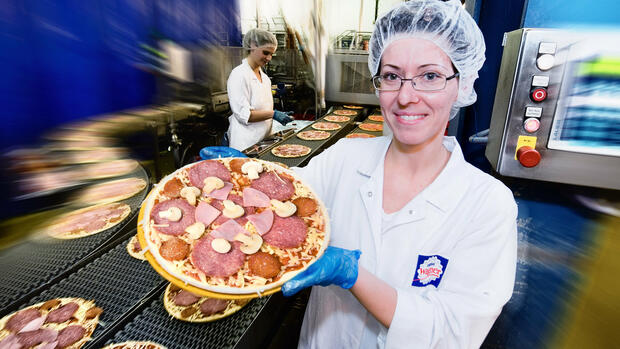Dusseldorf, Zurich Nestlé plans to spin off its European frozen pizza business. To this end, the Swiss food giant is founding a joint venture with the French financial investor PAI Partners. Nestlé wants to hold a “non-controlling interest with equal voting rights” in the joint venture, the group announced on Friday. The companies did not comment on the financial details of the deal.
Nestlé’s pizza business in Europe, with brands such as Wagner, Buitoni and Garden Gourmet, has annual sales of around 400 million francs. In the 2022 annual report, Nestlé speaks of “negative growth” in this area. Overall, the Swiss make a turnover of 94.4 billion Swiss francs.
The new pizza company will operate two production sites: in Nonnweiler, Saarland (Wagner Pizza) and in Benevento, Italy. A pizza plant in France was closed in March.
The new company will have its headquarters in Germany. In the Wagner factory, around 1,500 employees produce 350 million frozen products a year. Nestlé took a stake in the family business in 2005 and took it over entirely in 2013.
The pizza deal is Nestlé’s second partnership with PAI Partners. In 2016, the food company founded a joint venture for ice cream with the French financial investor. PAI Partner brought R&R Icecream into the business.
Nestlé pizza business: Union fears “bad consequences” for workers
Nestlé’s US ice cream business was sold to Froneri in 2019 for $4 billion. Froneri is now one of the world’s leading providers of ice cream with brands such as Schöller, Landliebe and Mövenpick.
>> Read also: Nestlé takes a stake in bottled meal YFood
Industry expert Christoph Driver, partner at the OC&C consultancy, thinks the joint venture makes sense: “A little more pressure from private equity is often very helpful for business.” There are few synergies between pizza and other Nestlé categories. A mini category is always difficult in a large corporation.
However, trade union representatives are critical of the joint venture. “This deal does not bode well. Together with the works councils and our members, we will ensure that the ominous alliance between Nestlé and PAI Partners does not have any bad consequences for the employees of Wagner Pizza,” says Guido Zeitler, Chairman of the Food and Beverage Restaurant Union (NGG).
Nestlé spun off its ice cream business to the Froneri joint venture in 2016. Partner is also financial investor PAI Partners.
(Photo: Imago)
The same joint venture Nestlé/PAI Partners announced the closure of the Froneri Schöller site in Nuremberg this week. The administrative headquarters with 150 employees is to be closed by the end of 2024. Froneri wants and needs to be faster and more agile, the reason given. In contrast, up to 60 new jobs are to be created at the main location in Osnabrück.
>> Read also: How the Nestlé Germany boss wants to make milk more climate-friendly
Union boss Zeitler warns: Since the entry of PAI Partners, “radical restructuring” has been carried out at the traditional ice cream manufacturer Schöller, operational co-determination has been undermined and “hundreds of jobs have been cut”.
“It is now a matter of working closely together to prevent the employees at Wagner Pizza from suffering just as much from the radical profit maximization of the Nestlé managers as their colleagues at Froneri-Schöller,” said Zeitler. When asked by the Handelsblatt whether job cuts were planned, a spokesman for Nestlé Germany said: “The joint venture is the best basis for expanding the pizza business in Europe.”
The outsourcing fits into the Swiss company’s long-term strategy. “Nestlé is adjusting the portfolio in a very targeted manner,” says industry expert Driver. Nestlé is concentrating on high-growth regions and categories such as coffee, pet food and baby food. Driver predicts that this approach will result in further divestments in other areas over the next few years.
Nestlé wants to focus on healthier products
The sale of Herta’s sausage division was only partially successful in 2019. 60 percent were taken over by the Spanish company Casa Tarradellas. Nestlé boss Mark Schneider wants to focus on healthier products and is investing in plant-based alternatives to meat, fish and seafood.
The group recently published a nutritional rating for the entire product portfolio for the first time. Nestlé relies on the so-called “Health Star Rating” (HSR) for this. Ingredients such as sugar and saturated fatty acids lower the rating, while vegetables, fruit or a high protein content increase the value.
According to this, Nestlé generates 37 percent of sales worldwide with food that has a rating of over 3.5 points and is therefore considered healthy. 21 percent of sales are attributable to products with a rating of less than 1.5 points and are therefore classified as unhealthy. In Germany, Nestlé has a lot of catching up to do when it comes to the sales contribution of healthy food.
>> Read also: Start-up Every Foods benefits from two trends with frozen meals
But the spin-off of the frozen pizza business also has economic reasons. While frozen pizzas were booming during the pandemic, the market is competitive in times of inflation. According to market researcher NielsenIQ, 4.5 percent fewer pizza packs were bought in Germany in the months up to October 2022 than in the same period last year. With around a quarter of the market share, Wagner Pizza is number two in Germany behind Dr. Oetker.
CEO Schneider trims the group to margin and sorts out weakening business – especially when it no longer fits into the group’s health strategy. That goes down well with investors. In a recently published study, Vontobel analyst Jean-Philippe Bertschy praised the fact that Schneider is taking further steps “to tackle the underperformers at the level of the individual business units faster and more comprehensively than planned”.
More: Nestlé increased prices by more than eight percent in 2022 – margins come under pressure
